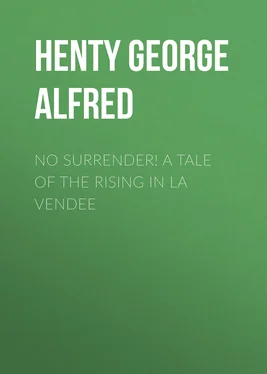George Henty - No Surrender! A Tale of the Rising in La Vendee
Здесь есть возможность читать онлайн «George Henty - No Surrender! A Tale of the Rising in La Vendee» — ознакомительный отрывок электронной книги совершенно бесплатно, а после прочтения отрывка купить полную версию. В некоторых случаях можно слушать аудио, скачать через торрент в формате fb2 и присутствует краткое содержание. Жанр: foreign_children, foreign_antique, foreign_prose, prose_military, на английском языке. Описание произведения, (предисловие) а так же отзывы посетителей доступны на портале библиотеки ЛибКат.
- Название:No Surrender! A Tale of the Rising in La Vendee
- Автор:
- Жанр:
- Год:неизвестен
- ISBN:нет данных
- Рейтинг книги:4 / 5. Голосов: 1
-
Избранное:Добавить в избранное
- Отзывы:
-
Ваша оценка:
- 80
- 1
- 2
- 3
- 4
- 5
No Surrender! A Tale of the Rising in La Vendee: краткое содержание, описание и аннотация
Предлагаем к чтению аннотацию, описание, краткое содержание или предисловие (зависит от того, что написал сам автор книги «No Surrender! A Tale of the Rising in La Vendee»). Если вы не нашли необходимую информацию о книге — напишите в комментариях, мы постараемся отыскать её.
No Surrender! A Tale of the Rising in La Vendee — читать онлайн ознакомительный отрывок
Ниже представлен текст книги, разбитый по страницам. Система сохранения места последней прочитанной страницы, позволяет с удобством читать онлайн бесплатно книгу «No Surrender! A Tale of the Rising in La Vendee», без необходимости каждый раз заново искать на чём Вы остановились. Поставьте закладку, и сможете в любой момент перейти на страницу, на которой закончили чтение.
Интервал:
Закладка:
"If you like, you can ride north to Saint Florent. If there should be any tumult, I charge you not to take any part in it. You had better leave your horse at some cabaret on this side of the town, and go in on foot. It is possible that there will be no trouble there, for they are sure to have made preparations against it; and it is more likely that there will be disturbances at smaller places. Still, it will be interesting to mark the attitude of the peasants.
"You see, if there is to be a war, it is their war. The gentlemen here would have fought for the king, had there been a shadow of a prospect of success, and had he given the smallest encouragement to his friends to rally to his support. They might even have fought against the disturbance of the clergy. But they would have had no followers. The peasants cared but little for the king and, though they did care enough for the priests to aid them to escape, they did not care enough to give battle for them. They are now going to fight for their own cause, and for their own liberty. They have to show us that they are in earnest about it, before we join them. If they are in earnest, we ought to be successful. We ought to be able to put a hundred thousand men in arms and, in such a country as this, we should be able to defy any force that the Convention can send against us; and to maintain the right of La Vendee to hold itself aloof from the doings of the rest of France.
"But, as I said, until we know that they are really in earnest, we cannot afford to throw in our lot with them; so if you go to Saint Florent, keep well away from the point where the drawing is to take place. Watch affairs from a distance. I have little doubt that those who go will go with the determination of defending themselves, but whether they will do so will depend upon whether there is one among them energetic enough to take the lead. That is always the difficulty in such matters. If there is a fight we must, as I say, simply watch it. It is, at present, no affair of ours. If it begins, we shall all have our work before us, plenty of it, and plenty of danger and excitement, but for the present we have to act as spectators."
It was a ride of fifteen miles to Saint Florent and, although Leigh had twice during the winter ridden there with Jean, he had some difficulty in finding his way through the winding roads and numerous lanes along which he had to pass. During the early part of the ride he met with but few people on the way. The church bells were ringing, as usual, and there was nothing to show that any trouble was impending; but when he arrived within two or three miles of the town, he overtook little groups of peasants walking in that direction. Some of them, he saw, carried pitchforks. The rest had stout cudgels.
Saint Florent stood on the Loire and, in an open space in the centre of the town, the authorities were gathered. Behind them was a force of gendarmes, and in the middle of their line stood a cannon.
Leigh had, as Jean had told him, left his horse outside the town; and now took up his place, with a number of townspeople, on one side of the square. As the peasants arrived, they clustered together at the end of the street, waiting for the hour to strike at which the drawing was to begin. A few minutes before the clock struck, some of the gendarmes left the group in the centre of the square, and advanced to the peasants. They were headed by an officer who, as he came up, exclaimed:
"What do you mean by coming here with pitchforks? Lay them down, at once!"
There was a low murmur among the peasants.
"Follow me!" he said to his men and, walking up to one of the men carrying a pitchfork, he said:
"I arrest you, in the name of the Republic."
In an instant a young man standing next to the one he had seized sprang forward, and struck the officer to the ground with his cudgel.
"Follow me!" he shouted. "Make for the gun!"
With a cheer the peasants rushed forward, overthrowing the gendarmes as they went. The municipal authorities, after hesitating for a moment, took to their heels in the most undignified manner. The gun had not been loaded. The gendarmes round it, seeing that they were greatly outnumbered, followed their example; and the peasants, with exultant shouts, seized the cannon and then, scattering, chased the gendarmes out of the town.
Never was a more speedy and bloodless victory. Headed by their leader, whose name was Rene Foret, the peasants went to the municipality, broke open the doors, took possession of the arms stored there, collected all the papers they could find, and made a great bonfire with them in the centre of the square. Then without harming anyone, or doing the slightest mischief, they left the town and scattered to their homes in the Bocage.
Leigh waited until all was over, returned to the cabaret where he had left his horse, and rode on. Passing through the little town of Pin a powerful-looking man, some thirty-five years old, with a quiet manner, broad forehead, and intelligent face, stepped up to him.
"Pardon, monsieur," he said; "but you have come from Saint Florent?"
"Yes," he replied.
"Has aught happened there?"
"Yes, the peasants attacked the gendarmes, who fled, leaving their cannon behind them. The peasants took what arms there were in the municipality, and made a bonfire of the papers. They then, without doing any damage, dispersed to their homes."
"They have done well," the man said. "They have made a beginning. My name, monsieur, is Cathelineau; my business, so far, has been that of a hawker. I am well known in this part of the country. Maybe, sir, you will hear my name again, for henceforth I am an insurgent. We have borne this tyranny of the butchers in Paris too long, and the time has come when we must either free ourselves of it, or die. You belong to another class, but methinks that when you see that we are in earnest, you will join."
"I doubt not that we shall," Leigh said. "I am but a lad yet; but I hope that, when the time comes, I shall do my part."
The man lifted his hat and moved off, and Leigh rode forward again. He was struck with the earnest manner of the man. He had spoken calmly and without excitement, expressed himself well, and had the air of a man who, having determined upon a thing, would carry it through.
"I expect I shall hear of him again," he said to himself. "A man like that, travelling round the country, no doubt has a deal of influence. He is just the sort of man the peasants would follow; indeed, as it seems to me, that anyone might follow."
It was late in the afternoon when he arrived home, and told his sister what he had witnessed.
"I am not surprised, Leigh," she said. "If I were a man I would take up arms, too. There must be an end to what is going on. Thousands have been murdered in Paris, men and women; and at least as many more in the other great towns. If this goes on, not only the nobles and gentry, but the middle class of France will all disappear; and these bloodstained monsters will, I suppose, set to to kill each other. I feel half French now, Leigh, and it is almost too awful to think of.
"It seems to me that the only hope is that the peasants, not only of the Bocage, but of all Poitou, Anjou, and Brittany, may rise, be joined by those of other parts, and march upon the towns; destroy them altogether, and kill all who have been concerned in these doings."
"That would be pretty sweeping, Patsey," Leigh laughed. "But you know I hate them as much as you do and, though I don't feel a bit French, I would certainly do all that I could against them, just as one would kill wild beasts who go about tearing people to pieces. It is no odds to me whether the men, women, and children they kill are French, or English. One wants to put a stop to their killing."
"I wish, now, that I had not brought you out with me, Leigh."
Читать дальшеИнтервал:
Закладка:
Похожие книги на «No Surrender! A Tale of the Rising in La Vendee»
Представляем Вашему вниманию похожие книги на «No Surrender! A Tale of the Rising in La Vendee» списком для выбора. Мы отобрали схожую по названию и смыслу литературу в надежде предоставить читателям больше вариантов отыскать новые, интересные, ещё непрочитанные произведения.
Обсуждение, отзывы о книге «No Surrender! A Tale of the Rising in La Vendee» и просто собственные мнения читателей. Оставьте ваши комментарии, напишите, что Вы думаете о произведении, его смысле или главных героях. Укажите что конкретно понравилось, а что нет, и почему Вы так считаете.












